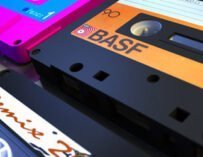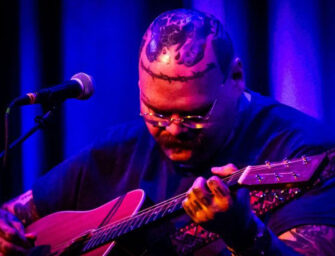Eight local songwriters, including Roger Cook and Beki Bondage, tell the stories behind some of our home city’s classic songs
‘LOVERS OF THE WORLD UNITE’
BY ROGER COOK OF DAVID & JONATHAN
1966 Columbia
“It was based on something that was happening in the 60s, the socialist/communist slogan, ‘Workers of the world, unite.’ It was quite a banner-carrying crowd of people and one day I just had the bright idea of saying, ’Why not Lovers Of The World Unite?’ That was just before the brotherhood thing started with flower power and it just seemed like a good idea and so we wrote the song. We were almost certainly on the road as David & Jonathan. Most of our songs were written on the road during that time, but I can’t remember exactly where.
“That particular song would have been written between the two of us with the consent of both of us with regards to the lyrics and the music. I wrote most of the lyrics because it was a song that originally came out of my head. Believe it or not, we wrote using ukuleles. Both he and I played ukuleles and at one point we got a couple of tenor guitars, which have four strings. But I believe that was written on ukuleles.
“I knew we’d written a hit. It was a very catchy tune but it wasn’t the kind of tune that anybody could sing while waiting for a bus. It was very rangy because both Roger [Greenaway] and I could sing very high and pretty low, so I think the song probably covers about an octave and a half. It wasn’t really a singalong song, it was a performance song for he and I.
“It was the beginning of that whole brotherhood, put some flowers in your hair, thing that was going on and the lyric reflected that. It was just a statement to make at the time, we weren’t the first people to be thinking along those lines but we came up with the song and what was a very catchy title.
“When we wrote that song we had the Harold Wilson government which was a totally socialist government, pink going on red, and so the title resonated with the people at the time but I feel the song is still relevant. I think if somebody was to record the song with the sounds and attitudes that are being used now it would still be popular. It’s a timeless message, I’m living in the Trump era and there are great divisions in America politically and that song would be perfect right now for over here.”
‘LAST ROCKERS’
BY BEKI BONDAGE OF VICE SQUAD
1980 Riot City
“I’m not entirely sure what year I wrote the lyrics but they would have been scrawled in an old school exercise book. Back in the 80s I would give sheets of lyrics to original Vice squad guitarist Dave Bateman and he would write chords around them, which is the opposite of how I write these days. Generally, Vice Squad guitarist Paul [Rooney] comes up with a riff and I find a vocal melody and sing a chorus and he finds the chords underneath, but as teenagers in the old band we didn’t know how to construct songs or how to play our instruments, which turned out in our favour as it meant we couldn’t copy the ‘real’ bands and consequently we sounded quite unique.
“Last Rockers is a typically depressive adolescent song about nuclear war and being too young to die but too late to live. CND was pretty big at the time and members of my family were active in the movement, so it was something I was very aware of. Like most teenagers, I felt I was immortal and I believed punks were the ‘last rockers,’ the final youth cult before the apocalypse. I was obsessed with punk and all I wanted to do was sing in a band and be part of it, so I would often romanticise the idea of punk in my lyrics. It was easy to wallow in pubescent hormones and self-pity and glorify your tribe when you lived with your parents and they paid the bills!
“Once Dave had written some music around the lyrics he told me that he’d ‘written the perfect song,’ which of course he hadn’t, but he’d certainly written something that sounded quite different. We borrowed £200 and recorded the song in Cave Studios, an eight-track facility in St Pauls, along with two other songs.
“Several bands have covered the song, which is the ultimate compliment. There is a Canadian band called The Last Rockers and a Colombian band called Los Ultimos Rockeros who cover Vice Squad songs and a Last Rockers TV channel, plus we have our own label called Last Rockers Records.
“All these years later I think we were quite courageous being in a band so young and making things happen, we got banned from virtually every town in the West Country at one point because of violence at gigs, yet we kept going and eventually signed to EMI and made it as far as the USA – pretty good going for four clueless kids. I do wish that I’d waited ‘til I was older, at least in my twenties, before I’d joined a band and started songwriting as no-one is at their peak creatively in their teens. Nonetheless, Last Rockers seems to have stood the test of time as a punk song.”
‘PAPA’S GOT A BRAND NEW PIGBAG’
BY OLLIE MOORE OF PIGBAG
1981 Y Records
“It’s important to say that the song was written collectively, that was always the way we worked as a band as everyone had an equal input to the music that evolved. I think it’s fair to say that Pigbag, the band, and Papa’s Got A Brand New Pigbag were inseparable in many people’s view.
“In the spring of 1980 I was jamming with Simon, and we had been put in touch with some guys in Cheltenham who had heard that Simon had left The Pop Group and asked if he would be interested in playing with them. We would go up to Cheltenham and play in a place called Beech House in a room with black walls. Sadly early recordings from these sessions were lost from an Akai reel-to-reel tape recorder. These sessions were where Papa… was born and it would go on for about 20 minutes in a frenzy of percussion, including frying pans and horns! The band was James Johnstone, Chip Carpenter, who were in a punk band called Hardware, Roger Freeman was on timbales and percussion and Chris Hamlin on congas and clarinet, Chris Lee was on trumpet, plus myself and Simon Underwood.
“We were still raw, rough, self-taught musicians, high on energy. We didn’t have a grasp of bar lengths and sections, so when it came to recording the solos it was decided that Roger would stand in front of us with a stopwatch and after one minute of free-blowing he signalled us to end.”
‘DOLE AGE’
BY DENNISON JOSEPH OF TALISMAN
1981 Recreational Records
“It was 1979 and it was the morning after Margaret Thatcher was inducted as Prime Minister of the country. We were in a rehearsal that evening and one of the youngest members of the band, Leroy Forbes, who was the lead guitarist at the time, exclaimed, ‘Do you know what they’ve done, they’ve just elected Maggie as Prime Minister!’ That young man at 18 had some sort of premonition that this wasn’t going to be good. We continued our lives but then during the start of Maggie Thatcher’s reign, all this negative stuff and these bad vibes started happening, culminating in three million people on the dole – and it wasn’t like that before
“Also in 1980 was the riots in St Pauls. People hadn’t properly rioted in Bristol since the 30s and 40s. She caused that because of the unemployment situation, especially in St Pauls among young black men. There was nothing for them to do, that breeds frustration. So it created the situation of young men just hanging around doing nothing in big numbers. One of the lines in the song is, ‘We’re liming all day.’ ‘Liming’ is a term that was in Trinidad in the 70s with young men having nothing to do, so they’re just liming. Not long after the riots came the end of the sus law, but before that young black men were being harassed by the police for no particular reason. If you were in a group of three, four or five they had the right to suspect you of going to commit a crime. Black guys had had enough of that kind of behaviour and so the riots kicked out.
“I had a rough idea of the song and I wrote the lyrics myself. I brought it down to the rehearsal room and we thrashed it out and created an intro and stuff like that. All of these things have to be tested to see people’s reaction.
“The song is about two people, a young guy and a young girl, trying to get into a concert but they didn’t have any money in their pockets – it shows how difficult it was for young people, black and white, to find any jobs in those days. A lot of council houses were repossessed at that time. It was a scheme that the Conservatives kicked off for people to buy their homes and all of a sudden people found themselves in a worse situation with mortgages that they couldn’t afford to pay. A lot of homes were taken away from under people’s feet. So that’s the basis of how that song came out.
“People are still talking about that song now and I sometimes think, ‘I don’t want to play that song anymore because times have changed.’ They call it Jobseeker’s Allowance nowadays they don’t call it the dole – but everywhere we go people still want to hear that song.
‘BRIAN RIX’
BY DAVEY WOODWARD OF THE BRILLIANT CORNERS
1987 SS20
“Brian Rix was never intended as a single, it was part of a collection of songs on our What’s In A Word mini-album that we released in 1986. The album was our first collection of songs that critics called ‘jangly indie pop.’ At this time I was still living in Stokes Croft in an attic flat on the main road, where the band also rehearsed. We were a tight gang then; Bob [Morris], Winston [Forbes], Chris [Galvin] and Dan [Pacini], drinking at The Bell and watching bands at The Tropic most nights. I was writing two or three songs every day and sleep was a thing of the past.
“I know the riff came first, it was influenced by a late 70s band called The Fire Engines who made delightful scratchy pop. I remember wanting to write a bunch of songs that were more quintessentially English. Most of the songs I had written before were in a Velvets, Dylan vein and I had got a bit bored of that. Somewhere in my mind I wanted to do something that was anti-rock, no posturing, something quite childlike, innocent and absurd. I have no idea why Brian Rix – possibly those Whitehall farces that the BBC showed in my teens had unconsciously stuck in my mind? This and a combination of meeting posh girls and literally being caught with my pants down on one occasion in my youth also influenced the lyrics. The song took three minutes to write.
“A combination of hard work, coincidence and luck made the song more well-known. We were regularly getting positive reviews in the music press and by playing up and down the country, we had built up quite a following. An old friend called Andy Franks saw us play in London and offered to help us out. I think in the space of a few months I had a publishing deal, Brian Rix had been re-recorded as a single and the man himself appeared in the video which got shown on national TV, The Tube. Radio 1 were playing it and it became a student disco favourite.
“Although it’s one of the most well-known songs that people associate with The Brilliant Corners, there were many others the fans preferred, Teenage and Delilah Sands to name but two. I’ve definitely written many better songs before Brian Rix and after it, but I think for many people it remains a catchy, happy moment in indie music history and that’s OK by me.”
‘JACKET HANGS’
BY GERARD LANGLEY OF THE BLUE AEROPLANES
1990 Ensign
“Jacket Hangs was written as a pretty complete poem first. So I had all the words done and I jigged it around a little bit when Angelo [Bruschini] came in with the riff. We’d just finished supporting R.E.M. and most of the Swagger album had been written before that point, because we played quite a few of the tracks on that tour, but we wrote that one afterwards when we were rehearsing at Real World.
“Quite often what I do is that I have complete sets of words and I wait for a suitable chord sequence or a riff to turn up. Angelo had just bought a Gordon Smith 12-string guitar. Quite often when people buy new instruments they come up with something new, and that happened with that riff. I went, ‘Woah, I like that, that’s a cool riff,’ and we started working on it a bit and changed sections of it.
“I had this poem which was based on three meanings of the word ‘suit’ – so a suit of clothes (i.e. appearances) a suit of cards (i.e. chance) and ‘to press one’s suit’ which is the old fashioned term for approaching someone’s father about wanting their daughter’s hand in marriage – which is where the word ‘suitor’ comes from as you would press one’s suit with the parents. I was just playing around with these three elements and that image representing all of those things and then the riff came in and it just seemed to fit.
“I would have written it on a big old Imperial typewriter that my dad gave me, in my house in Windmill Hill near Victoria Park. At that point I had a table in the window so would have been looking out of the bay window while I was doing it. It would have come out of a notebook, I’ve got so many notebooks full of stuff, I still do.
“I was writing quite a lot of poetry and working up a lot of material at the same time. I think the atmosphere around it was from the REM tour. I remember someone saying to me in an interview once, ‘Your words are rubbish they just don’t mean anything at all, you’re making up words that don’t make sense,’ so I said ‘like what?’ and they quoted a line from Jacket Hangs, ‘Siamese cat drapes, what does that mean?’ and I said, ‘Try and imagine the idea of pointless luxury, like the idea of leopardskin curtains isn’t enough for you, they have to be made out of Siamese cat skins,’ and he just looked at me and went, ‘Oh!’. So everything does mean something, it’s actually very specific about things that are going on, it just gets a bit oblique. I think people relate to it because it seems to make sense emotionally. They understand how the images have coalesced together to make a point, even if they don’t quite understand what that point is.
“Originally it started just with that guitar riff which then didn’t come back in, but we decided it was better to have it after each chorus because it’s a pretty stonking riff. The vocal you hear is the first time that I did it, it was the first take.
“It’s the only Blue Aeroplanes song which has never been dropped from our live set. There’s something weird about Jacket Hangs, it’s sort of definitive of us. If you were to pick one song, that would be the one. It’s not too song-like and it’s not too poem-like, it’s not too fast and it’s not too slow, it’s got a really good riff that isn’t rock and isn’t pop either, and it isn’t even that indie because it’s really well produced. It sort of doesn’t fit with anything – which is a bit like the Aeroplanes really!”
‘BEAUTIFUL EYES’
BY RITA LYNCH
1991 Moles Records
“I was living in St Pauls at the time I wrote Beautiful Eyes. It’s where I’ve lived for a very long time but back then I still hadn’t got my housing association flat, I was moving around quite a lot, in bedsits and shared houses and stuff. At the time I was going out with a woman, I was gay. I’d fallen in love and we were going out together. We had quite a tempestuous relationship and we lived together for a little bit. She was my first girlfriend so it was quite a big deal for me, but it was a stormy relationship – we would split up and then get back together. The song was inspired by her and the love that we had together. I wrote a lot of songs at that time.
“I penned it on an acoustic guitar and it was written very quickly in the way some songs jut come about once you’ve had the original idea. The opening line, ‘You’ve got beautiful eyes,’ came straight away and then I embellished and worked on the rest. It is a song that talks about loving somebody and being in love but also about jealousy, betrayal and how that can make you feel. It’s the idea that you can be with somebody and yet they can still seem very mysterious to you, that feeling that you’re together but you’re also on your own.
“People liked Beautiful Eyes almost straight away, and I think everybody could relate to it. They liked it so much that I used to get a bit annoyed and think, ‘I have written other songs!’ But it’s one of my most pivotal songs, it’s the one people still always talk to me about. So much so that it’s almost like it’s a cover. There’s a purity about it and not too much embellishment, so they hear the rawness in my voice and even the guitar playing was a little bit raw. People were always moved by it. You hear explicit lyrics about sucking and touching and that was good for the lesbian world.”
‘MOONSHINE FREEZE’
BY KATE STABLES OF THIS IS THE KIT
2017 Rough Trade
“Maybe I should start by trying to work out how I write songs in general? So far I’ve always been quite a patchy writer. Doing a lot of writing things down but then snipping them up and sorting it out into songs. Cutting stuff up and seeing what happens. ‘Collage’ is a word that springs to mind. Words trickle in over a long space of time and then I gather them together in one place to untangle the accumulated writings and tease them together into something vaguely resembling a song. I bundle up the texts I’ve been working on and lock myself away on my own for as long as possible. And that’s usually when the music emerges. It kind of grows out of and shapes itself around the words.
“The phrase, ‘Moonshine, moonshine, moonshine freeze,’ is from a clapping game that a friend taught me and my daughter and when you say ‘freeze’ you have to stop moving and freeze absolutely still for as long as you can. For some reason, this rhyme had a real Velcro effect on me. I couldn’t shake it off and I kept thinking about it. It kept cropping up in songs I was working on. Like the ‘Triangles are tricky’ line, it popped up in a few other songs before it settled into this one. New words that hadn’t yet been written grew out of the phrase, and slowly the meaning and idea patterns within the song started to appear.
“But a key theme for me in this song is simply that as humans we shift in and out of sync with each other. Like different sized cogs turning at slightly different rates and sometimes lining up with each other and other times being in opposition.
“Of course there is more than just words to songwriting. What the other musicians brought to this song in the recording process is enormously important. The sound of the song is quite wonky and I think that has an effect on how the ideas are carried to listeners.
“What I really love is when people are able to draw their own conclusions and interpret the song in their own way. It is a very important element of songwriting for me. The song gets passed through the prism of the listener and it’s often astonishing how accurate their interpretations are, or equally how very different their interpretation of the song is.”
Read more features like this, along with more artist interviews, news, tips, reviews and gear in Songwriting Magazine Autumn 2018
Read more ‘How I wrote’ features here



































Related Articles